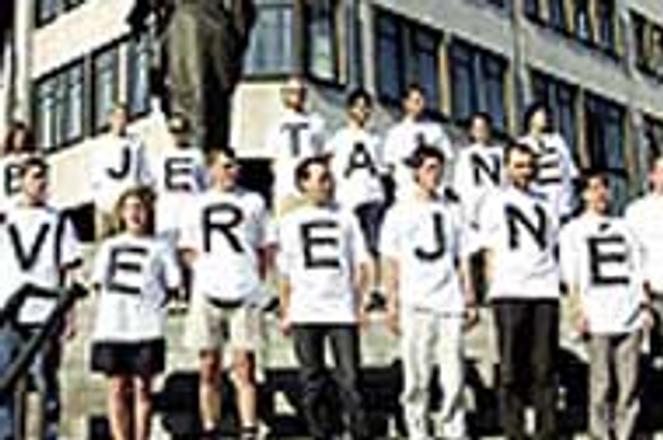NGOs and other promoters of a transparent, open society hailed the passage of the Freedom of Information Law on the steps of parliament. Their message means 'What isn't secret is public.'photo: TASR
The Slovak parliament approved a new Freedom of Information law during its regular session on May 17. The basic principle of the law, which will take effect on January 2001, is explained by the slogan of the information campaign which preceded the legislation's approval: Čo nie je tajné, je verejné (What isn't secret is public).
The law will secure the public's right to access information on state bodies, regional governments and other public entities. Information which is explicitly off-limits or circumscribed by other laws will be declared confidential, as will personal information on private citizens. The law also sets the procedures for applying for requested information.
According to the authors, the law will guarantee the more open and transparent working of the public sector, serve as an effective control over public sector financing, and decrease corruption in the state and public sector. Several months of lobbying MPs in order to gain support for the law made its passage possible, they said.
"This is the most important law to be approved in this country, second only to the establishment of our basic human rights in the constitution," said a visibly happy Ján Lángoš, main author of the law and chairman of the Democratic Party (DS), a tiny faction within the Slovak Democratic Coalition (SDK), after the law was passed.
The law's passage was not entirely smooth, however. During May parliamentary sessions, several key alterations were proposed mainly by deputies from the socialist SDĽ (Party of the Democratic Left, a ruling coalition member). Ultimately, though, the law was approved without any significant changes by 80 of the 86 deputies present during the vote.
Compared to other former eastern bloc countries which have already ratified Information Laws, such as the Czech Republic, Lithuania, Slovenia and Ukraine, it took Lángoš a relatively short time to get it through parliament. The fast passage of the law was praised by the US Embassy in Slovakia. According to Douglas Hengel, chargé d'affaires of the Embassy, the Freedom of Information Law was the latest of several reforms Slovakia had adopted to consolidate democracy and the rule of law. "We applaud the approval of this law which will help in the fight against corruption and foster a more effective government," Hengel said.
'Open state'
According to Lángoš, the 1992 Slovak Constitution had introduced access to information as one of the basic rights enjoyed by citizens, but fell short of providing full access. The new law, he said, would solidify information rights and provide guarantees which the current legislation could not. "This law finally changes Slovakia from a confidential state into an open state," Lángoš said.
As a model for the Slovak law, Lángoš said he studied the original version of the Czech law from 1994. That first version was changed because the law sat in the Czech parliament for two years - when it finally took effect in January 2000, the final product was weaker than the original 1994 proposal.
"Taking the experience of the Czech republic into consideration, we wanted to have our law approved as soon as possible and thus avoid discussions that would have resulted in the implementation of some elements that would have made the Freedom of Information law weaker than it is now," Lángoš said.
Proposals during parliamentary sessions which would have weakened the law included restricting information on unfinished documents and the environment, and imposing gag orders on state servants, Lángoš added.
In order to approve the law as proposed, Slovak non-governmental organisations (NGOs) lent a helping hand. According to Helena Woleková, an activist with the NGO Space, had the above mentioned proposals been approved, the final quality of the law would have been significantly diminished. "For example, people have to have access to unfinished documents because once they are closed it is difficult to open them," she said. "Also people have to have access to information about the environment they live in."
With the law's passage, a new concern has arisen - putting it into practise. According to both Lángoš and Woleková, Slovaks still have respect for state and public servants and consequently may be reluctant to request information.
"I think that this law is designed mainly for young people. I am quite certain that the older generation that spent most of their life under communism will never use this law," Lángoš said.
The generation issue will also be problematic when older state servants are expected to provide the information. "Younger workers will make this law part of their everyday life easier than older ones will," he said.
Woleková, meanwhile, said that high-ranking officials may be even more reluctant to provide information than low-ranking clerks. "Some of the lower state officials are already used to providing information," Woleková said.
In order to raise public awareness about the law, NGOs will run a national campaign aimed at promoting the active use of the law.
According to Woleková, only time will tell how readily Slovaks embrace the law. "We have a bureaucratic tradition more than 100 years strong, dating back to the Austro-Hungarian monarchy," Woleková said. "We'll see how successful the law will be."


